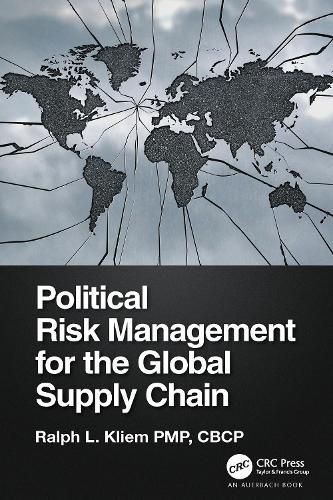Readings Newsletter
Become a Readings Member to make your shopping experience even easier.
Sign in or sign up for free!
You’re not far away from qualifying for FREE standard shipping within Australia
You’ve qualified for FREE standard shipping within Australia
The cart is loading…






The global business environment has never been so complex, making supply chains more fragile than ever. A stable business environment seems like a distant dream in today’s global marketplace; instability, not stability, has become the norm. Anti-globalization and nationalization, coupled with populist movements and transnational terrorism, just to name a few targeting global supply chains, now pose significant challenges and risks when doing business across the globe. To address such issues, Political Risk Management for the Global Supply Chain:
Provides an overview of basic political terminology and political risk management Presents the basic processes of political risk management Examines the current and future impacts of political events on global supply chains
By putting aside the passions that politics can raise, the book aims to objectively look at political risk management. Topics covered include:
Identifying different categories of political risk
Understanding the relationship of political risk management, enterprise risk management, supply chain, project management, change management, and business continuity
Laying the groundwork for efficient and effective political risk management
Evaluating the effectiveness of responses
The book begins with an overview on why political risk management is an important yet overlooked topic and the corresponding consequences if it is ignored or overlookedby enterprises and their global supply chains. Next, it provides systemic and systematic perspectives on political risk management and explains why the topic is more important than ever. Most important, it provides a framework that enterprises, regardless of nationality, can use to develop and deploy to manage political risks. The book concludes by discussing the full spectrum of developing, deploying, testing, and maintaining processes to conduct political risk management.
$9.00 standard shipping within Australia
FREE standard shipping within Australia for orders over $100.00
Express & International shipping calculated at checkout
The global business environment has never been so complex, making supply chains more fragile than ever. A stable business environment seems like a distant dream in today’s global marketplace; instability, not stability, has become the norm. Anti-globalization and nationalization, coupled with populist movements and transnational terrorism, just to name a few targeting global supply chains, now pose significant challenges and risks when doing business across the globe. To address such issues, Political Risk Management for the Global Supply Chain:
Provides an overview of basic political terminology and political risk management Presents the basic processes of political risk management Examines the current and future impacts of political events on global supply chains
By putting aside the passions that politics can raise, the book aims to objectively look at political risk management. Topics covered include:
Identifying different categories of political risk
Understanding the relationship of political risk management, enterprise risk management, supply chain, project management, change management, and business continuity
Laying the groundwork for efficient and effective political risk management
Evaluating the effectiveness of responses
The book begins with an overview on why political risk management is an important yet overlooked topic and the corresponding consequences if it is ignored or overlookedby enterprises and their global supply chains. Next, it provides systemic and systematic perspectives on political risk management and explains why the topic is more important than ever. Most important, it provides a framework that enterprises, regardless of nationality, can use to develop and deploy to manage political risks. The book concludes by discussing the full spectrum of developing, deploying, testing, and maintaining processes to conduct political risk management.